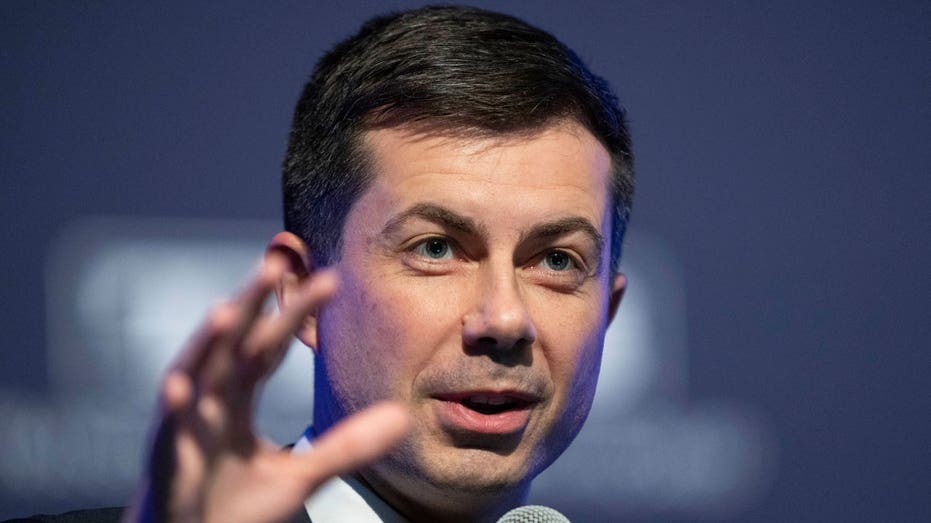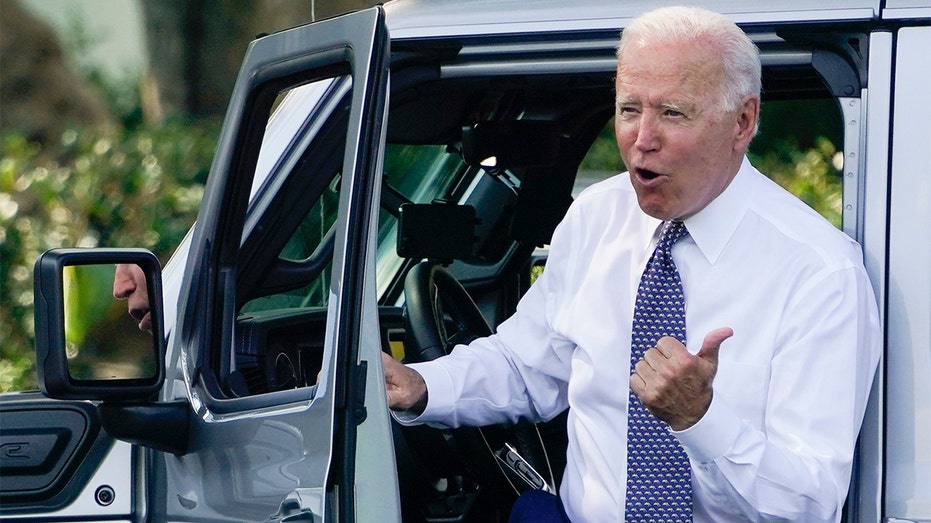Biden admin bragged about building ‘made-in-America’ EV charging network, then waived ‘Buy America’ rules
The government will allow non-US-made EV chargers to be used, which goes against Biden's stated intentions
Pushing an expensive electric vehicle is out of touch with reality: Benji Backer.
American Conservation Coalition founder Benji Backer discusses the pros and cons of electric vehicles and green energy on 'Kennedy.'
The Biden administration on Friday announced it would waive "Buy America" requirements as it pushes for the rapid development of a nationwide network of electric vehicle chargers, just days after it bragged about building a "reliable, made-in-America" infrastructure.
The decision will allow the network to be made with chargers not made in the U.S., even though President Biden boasted as recently as his State of the Union address that he was pushing for new standards that would require "all construction materials" for infrastructure projects to be produced in the U.S.
"Made in America," Biden said in his State of the Union speech on Feb. 7. "I mean it."
On Wednesday, the Department of Transportation’s Federal Highway Administration (FHWA) announced plans to install a network of 500,000 electric vehicle chargers by 2030 to support the goal of putting more electric cars on the road. FHWA’s announcement promised to "electrify the great American road trip" by "delivering a convenient, reliable and Made-in America electric vehicle (EV) charging network."
The administration has billions at its disposal for the public works project, thanks to the Infrastructure Investment and Jobs Act that President Biden signed in 2021.
CALIFORNIA'S GRID FACES COLLAPSE AS LEADERS PUSH RENEWABLES, ELECTRIC VEHICLES, EXPERTS SAY

The administration has billions at its disposal for the public works project, thanks to the Infrastructure Investment and Jobs Act that President Biden signed in 2021. (AP Newsroom / AP Newsroom)
But on Friday, FHWA released a regulation that waives current "Buy America" rules and will allow the use of EV chargers that aren’t made in America. FHWA said that while the infrastructure law includes a "Buy America" requirement, it also includes a waiver from those rules.
FHWA said that a "public interest" waiver is necessary in this case, because failing to grant one would slow down the process of installing EV chargers across the country – indicating that the government is valuing speed over the use of domestic materials.
In response to arguments from U.S. steel companies, trade associations and steelworkers’ unions that opposed the waiver, FHWA said that failing to grant a waiver would "threaten the ability for those infrastructure projects to be completed in a timely manner."
EXPERTS BLAME GREEN ENERGY POLICIES FOR EUROPE'S FULL-SCALE ENERGY CRISIS: 'A WARNING TO THE US'

An agency in the Department of Transportation, run by Secretary Pete Buttigieg, will allow non-U.S. EV chargers to be used in a massive expansion of EV infrastructure. (AP Photo/Manuel Balce Ceneta, File. / AP Images)
The agency also rejected arguments that it was going against the intent of Congress by allowing non-U.S. EV chargers to be used and insisted that the waiver would "encourage domestic industry to ramp up production of EV chargers."
"This waiver is being issued on the basis of its consistency with the public interest," FHWA said, adding that sticking to the domestic content requirements in the law would be "inconsistent with the public interest."
Under the waiver, EV chargers not made in the U.S. can be used to support the administration’s goal of installing 500,000 chargers by 2030 if they are assembled in the United States. That will be allowed for more than a year – starting from when the regulation takes effect next month through June 30, 2024.
After that, EVs chargers will still be permitted if they are assembled in the U.S. and if 55% or more of the components used in EV chargers are produced in the U.S.
OHIO RESIDENTS ERUPT AT TOWN HALL: ‘WHERE’S PETE BUTTIGIEG?'

President Joe Biden talks after driving Jeep Wrangler 4xe Rubicon on the South Lawn of the White House in Washington, Thursday, Aug. 5, 2021, during an event on clean cars and trucks. (AP Photo/Susan Walsh / AP Newsroom)
FHWA said that the second phase of the "Buy America" waiver will remain in place for five years, but also said it has the right to terminate it earlier if it wants.
The waiver goes against the stated intention of President Biden and various laws usually supported by Democrats. In 2021, Biden issued an executive order on "Ensuring the Future is Made in All of America by All of America’s Workers."
Pre-existing law already included a "Buy America" requirement for FHWA, and similar language was included in the infrastructure law that Democrats in Congress pushed for and that Biden signed in 2021.
GET FOX BUSINESS ON THE GO BY CLICKING HERE
The companies and groups opposed to the waiver included Nucor Corp., the Steel Manufacturers Association, United Steelworkers, the American Iron and Steel Institute, the Alliance for American Manufacturing and the AFL-CIO.




















